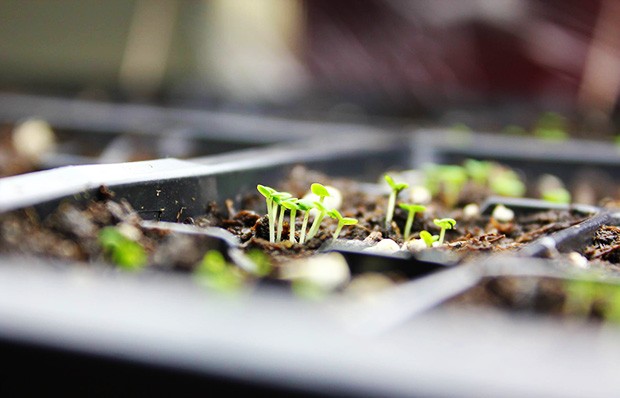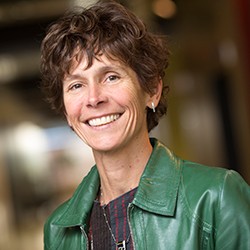These questions became the basis for a course Miller offered for the third time this year called, “You Are What You Eat (or Drink),” which combines the politics of food with documentary film.
“I love teaching this course because students get really involved and end up learning so much from each other,” she says. “Classes are a micro-community. They offer us a chance to work together, to discover our skills and to figure out how to use those skills to make a difference.”
One of Miller’s students, Tricia Toso, says the class underlines how every time we eat, we’re making ethical, environmental, economic and political choices. “The course complicates our choices, but it also offers an opportunity to explore alternative and sustainable food sources.”
Another student, Camilo Alvarez, credits the course with helping him recognize “numerous strategies that could potentially contribute to a better and more sustainable future.”
We sat down with Liz Miller to find out more.
What do you hope to achieve with this course?
Liz Miller: The idea is to use films to develop a critical framework about the industrial food system and to raise questions about our food choices. It’s challenging to figure how to eat ethically once you discover the politics of how food is produced and distributed, so incorporating alternatives and solutions into the course is essential.
Food is also deeply personal and a highlight of the course is an assignment about food and family stories. Last year the Montreal Gazette did a great video profile on this assignment that came out on Mother’s Day!
How was this year's course structured?
LM: Each week, we tackled a theme and watched excerpts from two-to-six documentary films. We started with sugar and ended up with plastic. In between, we covered themes like monocrops and monopolies, the oil we eat, the ethics of eating animals and genetic engineering.
For the final assignment, students get out into the city and develop a media profile on an alternative local food player. They can create a podcast, a video or a website, and they have to represent what makes this "alternative." So, if it’s a restaurant, how do they treat their workers? Who are their suppliers? How do they foster community? How do they deal with waste?
Can you describe a few of your students' media profiles?
LM: Montreal Food Change is a group project that profiled two organizations, Cycle Alimenterre and Coop La Maison Verte. I’ll let them explain in their own words:
"Our focus is on urban growers and organizations that are committed to creating a more sustainable city and to improve accessibility to affordable local and natural food. Through our project we hope to build networks that will provide the resources and support to urban farming initiatives so that they might thrive and contribute to a healthier urban environment."
Another group did a project called University Food Report Card: Comparing Sustainable Campuses across Canada, which analyzed and graded 11 universities. It’s a really great concept. Concordia is not yet top of the class, but that just leaves room for us to get better!
Two Italian student filmmakers visited a couple of the best family pizza restaurants in Montreal to explore the politics of “authenticity.” How does food help build community and how do you make a restaurant feel like home?
Another project focussed on a local initiative by a Concordia student that combines biking and gardening.
What's next?
Planning for the next class means watching a lot of films, visiting food alternatives throughout the city and the hardest part: staying away from sugar.
Each time I teach the course it’s a bit different because I discover new films, books and resources. For example, I'm currently working on an interactive documentary called The Shore Line, and the next class will definitely tackle oceans and the growing threats to fish and seafood.
I'll also be posting all the student projects and some film suggestions for anyone who cares about food.
Find out more about Concordia’s Department of Communication Studies.



 The student project Cycle Alimentaire focuses on urban growers and organizations that are committed to creating a more sustainable city. | Image courtesy of Cycle Alimentaire
The student project Cycle Alimentaire focuses on urban growers and organizations that are committed to creating a more sustainable city. | Image courtesy of Cycle Alimentaire
 Liz Miller | Photo by Concordia University
Liz Miller | Photo by Concordia University